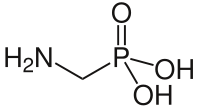
Evaluation of the herbicide glyphosate, (aminomethyl)phosphonic acid, and glyphosate‐based formulations for genotoxic activity using in vitro assays
Sign Up to like & getrecommendations! Published in 2023 at "Environmental and Molecular Mutagenesis"
DOI: 10.1002/em.22534
Abstract: Glyphosate, the most heavily used herbicide world‐wide, is applied to plants in complex formulations that promote absorption. The National Toxicology Program reported in 1992 that glyphosate, administered to rats and mice at doses up to… read more here.
Keywords: phosphonic acid; glyphosate; aminomethyl phosphonic; glyphosate based ... See more keywords

Effect of glyphosate acid on biochemical markers of periphyton exposed in outdoor mesocosms in the presence and absence of the mussel Limnoperna fortunei.
Sign Up to like & getrecommendations! Published in 2017 at "Environmental toxicology and chemistry"
DOI: 10.1002/etc.3820
Abstract: Glyphosate is currently the most widely used herbicide in agricultural production. It generally enters aquatic ecosystems through surface water runoff and aerial drift. We evaluated the effect of glyphosate acid on biochemical parameters of periphyton… read more here.
Keywords: absence; presence; effect glyphosate; glyphosate acid ... See more keywords

Sorption and desorption of glyphosate in Mollisols and Ultisols soils of Argentina.
Sign Up to like & getrecommendations! Published in 2017 at "Environmental toxicology and chemistry"
DOI: 10.1002/etc.3851
Abstract: In Argentina, glyphosate use has increased exponentially in recent years as a result of the widespread adoption of no-till management combined with genetically modified glyphosate-resistant crops. This massive use of glyphosate has created concern about… read more here.
Keywords: glyphosate sorption; sorption desorption; sorption; glyphosate ... See more keywords

Bumblebees can be Exposed to the Herbicide Glyphosate when Foraging
Sign Up to like & getrecommendations! Published in 2022 at "Environmental Toxicology and Chemistry"
DOI: 10.1002/etc.5442
Abstract: Herbicides are the most widely used pesticides globally. Although used to control weeds, they may also pose a risk to bee health. A key knowledge gap is how bees could be exposed to herbicides in… read more here.
Keywords: toxicology; glyphosate; exposed herbicide; chemistry ... See more keywords

Mechanistic modeling indicates rapid glyphosate dissipation and sorption-driven persistence of its metabolite AMPA in soil.
Sign Up to like & getrecommendations! Published in 2022 at "Journal of environmental quality"
DOI: 10.1002/jeq2.20437
Abstract: Residual concentrations of glyphosate and its main transformation product aminomethylphosphonic acid (AMPA) are often observed in soils. The factors controlling their biodegradation are currently not well understood. We analyzed sorption-limited biodegradation of glyphosate and AMPA… read more here.
Keywords: sorption; glyphosate; ampa soil; dissipation ... See more keywords

Target-site mutations conferring resistance to glyphosate in feathertop Rhodes grass (Chloris virgata) populations in Australia.
Sign Up to like & getrecommendations! Published in 2018 at "Pest management science"
DOI: 10.1002/ps.4512
Abstract: BACKGROUND Chloris virgata is a warm-season, C4 , annual grass weed affecting field crops in northern Australia that has become an emerging weed in southern Australia. Four populations with suspected resistance to glyphosate were collected… read more here.
Keywords: virgata; resistance; glyphosate; target site ... See more keywords

Glyphosate resistance in Ambrosia trifida: Part 1. Novel rapid cell death response to glyphosate.
Sign Up to like & getrecommendations! Published in 2018 at "Pest management science"
DOI: 10.1002/ps.4567
Abstract: BACKGROUND Glyphosate-resistant (GR) Ambrosia trifida is now present in the midwestern United States and in southwestern Ontario, Canada. Two distinct GR phenotypes are known, including a rapid response (GR RR) phenotype, which exhibits cell death… read more here.
Keywords: response; ambrosia trifida; glyphosate resistance; resistance ... See more keywords

EPSPS gene amplification conferring resistance to glyphosate in windmill grass (Chloris truncata) in Australia.
Sign Up to like & getrecommendations! Published in 2018 at "Pest management science"
DOI: 10.1002/ps.4573
Abstract: BACKGROUND Five glyphosate-resistant populations of Chloris truncata originally collected from New South Wales were compared with one susceptible (S) population from South Australia to confirm glyphosate resistance and elucidate possible mechanisms of resistance. RESULTS Based… read more here.
Keywords: epsps gene; chloris truncata; glyphosate resistance; resistance ... See more keywords

Distribution of glyphosate-resistant Amaranthus spp. in Nebraska.
Sign Up to like & getrecommendations! Published in 2018 at "Pest management science"
DOI: 10.1002/ps.4781
Abstract: BACKGROUND Palmer amaranth (Amaranthus palmeri S. Wats.), common waterhemp (Amaranthus tuberculatus var. rudis), and redroot pigweed (Amaranthus retroflexus L.) are major weeds occurring in fields throughout Nebraska with recurrent grower complaints regarding control with glyphosate.… read more here.
Keywords: amaranthus; glyphosate resistance; glyphosate resistant; glyphosate ... See more keywords

Gene expression in response to glyphosate treatment in fleabane (Conyza bonariensis) - glyphosate death response and candidate resistance genes.
Sign Up to like & getrecommendations! Published in 2018 at "Pest management science"
DOI: 10.1002/ps.4804
Abstract: BACKGROUND This study takes a whole-transcriptome approach to assess gene expression changes in response to glyphosate treatment in glyphosate-resistant fleabane. We assessed gene expression changes in both susceptible and resistant lines so that the glyphosate… read more here.
Keywords: response; resistance; glyphosate; glyphosate treatment ... See more keywords

The role of plant size in the selection of glyphosate resistance in Sorghum halepense.
Sign Up to like & getrecommendations! Published in 2018 at "Pest management science"
DOI: 10.1002/ps.4923
Abstract: BACKGROUND The effect of plant size (seedlings versus young plants versus adult plants) on the phenotypic level of glyphosate resistance and selection intensity (SI) in Sorghum halepense with and without a reduced glyphosate translocation resistance… read more here.
Keywords: plant; selection; glyphosate resistance; size ... See more keywords